At Democracy Forward, we equip people and communities—from teachers, parents, and health care providers to small businesses, students, scientists, and so many others—with tools to take their fights for democracy to the courts and beyond. Over the past year, we have continued to build our team and to expand our work to states and communities throughout the country, from blocking censorship laws, to challenging far-right power grabs, to protecting access to medication abortion, to protecting fair wages, and more.
In the last year alone, we represented and partnered with more than 100 organizations and communities in the critical fights our country faces today.
Here’s just a snapshot of 23 moments of impact in 2023:

1. Filed a first-of-its kind post-Dobbs case challenging an abortion ban on behalf of the generic manufacturer of mifepristone (the abortion pill). This lawsuit in federal court in West Virginia to the state’s abortion ban and other restrictions on behalf of GenBioPro is on appeal and could help protect access to medication abortion for those who need it.
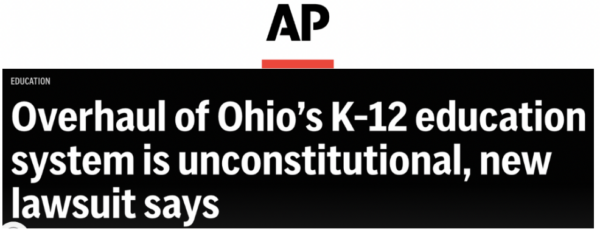
2. Challenged the DeWine Administration’s anti-democratic takeover of K-12 education governance in Ohio. The move by Ohio legislators to sneak sweeping provisions that restructure Ohio’s system of education governance and oversight in the state’s budget bill—in violation of the Ohio Constitution—will result in a public education system in Ohio that is no longer responsive to the needs of everyday people, but rather the desires and whims of the Governor. We slowed Gov. Mike DeWine’s takeover of public education from going into effect with a temporary restraining order. That order has been lifted but our fight continues as we await a ruling on our request for a preliminary injunction.

3. Provided the court with analysis from leading legal scholars on briefs in Biden v. Nebraska, explaining to the Court that the President’s student debt relief initiatives were lawful. While the Court declined to uphold those initiatives, our team’s work to shape public narratives and legal arguments has played a role in paving the way for future relief programs.

4. Represented rural and agricultural organizations in defense of the Consumer Financial Protection Bureau (CFPB) in CFPB v. CFSA in the U.S. Supreme Court in order to raise the alarm about how upholding the Fifth Circuit’s radical decision could upend the economy and cause real harm in people’s lives. The coalition explained for the Court that the Fifth Circuit’s opinion—which held that the CFPB’s funding structure violates the U.S. Consitution’s Appropriations Clause—in particular would undermine the funding structures of myriad federal agencies, including the Farm Credit Administration (FCA), and thus threaten the entirety of our nation’s agriculture sector.

5. Weighed in on a U.S. Supreme Court case, Securities and Exchange Commission (SEC) v. Jarkesy, on behalf of an originalist legal scholar to highlight how unfounded the arguments are in this case, which could provide the far right with yet another tool to attack, delay, and hamstring the ability of agencies like the SEC to protect the people and communities they were created to serve.

6. Supported the government’s ability to deliver for people by filing a brief on behalf of small businesses in the U.S. Supreme Court to warn the Court that a dangerous ruling in two related challenges—Loper Bright Enterprises v. Raimondo and Relentless, Inc. v. Commerce—could upend regulatory certainty and hurt small businesses across the country in the process.

7. Provided the U.S. Supreme Court with the expertise of small businesses in Moore v. United States to underscore the disastrous consequences for our democracy, for our economy and for small businesses in particular if the far-right legal movement has its way in this case. The radical legal arguments at issue here, if accepted, could threaten to upend the entire tax system.

8. Secured a preliminary court order blocking a state law, Act 372, signed by Gov. Huckabee Sanders that would criminalize librarians. Sections of Act 372 would have librarians and booksellers work under a vague and looming threat of criminalization that encourages them to self-censor, and severely limit readers’ access to books in libraries and bookstores.

9. Secured removal of “aiding and abetting” liability that would have criminalized social workers seeking to help clients navigate where to obtain abortion care in Ohio. Throughout our litigation on behalf of social workers and advocates in Ohio, the City of Lebanon, which was represented by far-right legal organizations, declined to defend the ban in court and repeatedly chose to retreat, rather than publicly defend its law.

10. Secured records concerning the Wisconsin Assembly’s Office of Special Counsel’s (OSC) efforts to prop up the Big Lie and worked to ensure government transparency as part of a lawsuit on behalf of a government watchdog organization to stop OSC from destroying public records in violation of the state’s public records retention law.

11. We secured a court order on behalf of parents finding that Mississippi’s attempt to direct COVID-19 relief funds to private schools was unlawful. The state has appealed and we are continuing to defend access and funding for public education. If this private schools funding mechanism is allowed to proceed, it will irreparably injure the interests of hundreds of thousands of schoolchildren and Mississippi taxpayers.

12. Contributed to state supreme court ruling that rejected a challenge to the state’s COVID-19 eviction moratorium and declined to extend a far-right takings clause doctrine. Our work in a series of cases related to the far-right’s dangerous use of this new doctrine, has limited its expansion in the context of fair housing initiatives.
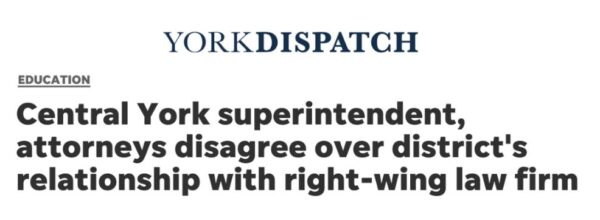
13. Uncovered national movements active in undermining quality public education in Pennsylvania and equipped communities on the ground with resources to bring needed transparency and accountability. Our public records requests filed in the state have helped to reveal previously undisclosed relationships between local school districts and a far-right law firm.
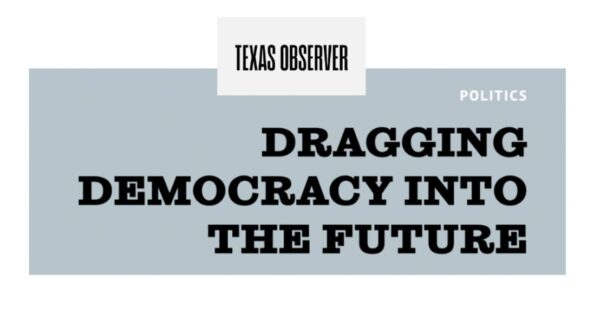
14. Hosted a panel, 2023: Democracy is Worth the Fight, at SXSW with Gen-Z activist Olivia Julianna and voting rights advocate Tayhlor Coleman on the fight for democracy’s future on the ground, in the states, and in the courts. We also premiered our video on the legacy of the late Congresswoman Barbara Jordan to a full house at our panel, and over four days, the team participated in nearly three dozen sessions and meet ups, expanding the bench of advocates for our work.
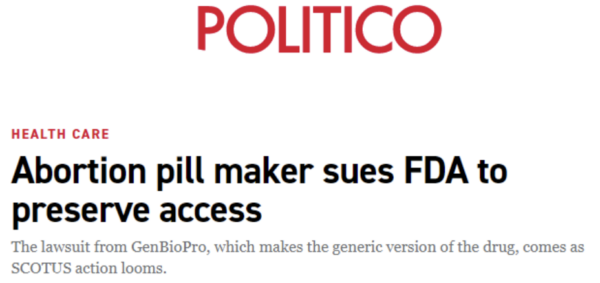
15. Filed litigation on behalf of the nation’s only generic manufacturer of mifepristone to secure access to the drug in response to efforts by extremist groups to remove its approval. Far-right special interests are using the courts to undermine the FDA’s authority and threaten access to the medication nationwide. This lawsuit on behalf of GenBioPro seeks to ensure legal processes are followed before the FDA makes any alterations to the approval and availability of mifepristone.

16. Opposed efforts by the Florida’s Attorney General to deprive voters of the opportunity to vote on the issue of abortion rights in the 2024 election. Florida’s Attorney General Ashley Moody specifically asked the state Supreme Court to keep the proposed abortion rights amendment off the ballot, and misused the expertise of medical professionals in her attempt to do so. We filed a brief on behalf of the American College of Obstetricians and Gynecologists (ACOG) in the state Supreme Court to address how the AG misrepresented guidance issued by ACOG to support her claims.

17. Secured a court order to remedy unconstitutional abuses at Angola prison in Louisiana concerning incarcerated persons’ access to health care. People imprisoned in the United States have a constitutional right to health care, but for decades, those in the Louisiana State Penitentiary at Angola have been denied that right or provided inadequate access. The ruling is the latest milestone in the 2015 class action lawsuit brought on behalf of the approximately 5,000 people incarcerated at Angola.

18. Opposed efforts to undermine the Affordable Care Act (ACA)’s preventive services requirements to protect patient access to cancer screenings and essential care. Our friend of the court brief on behalf of America’s leading health professionals organizations—representing hundreds of thousands of physicians and medical professionals—sounds the alarm that gutting the ACA’s extremely popular preventive care requirement will jeopardize access to essential care for millions of Americans.
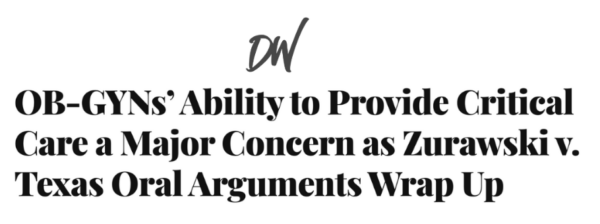
19. Filed a brief in the Texas Supreme Court on behalf of medical experts explaining the harms to women resulting from post-Dobbs abortion bans. Through these extremist abortion bans, far-right public officials in Texas are deterring physicians from providing, and their patients from receiving, critically necessary abortions even when that care is vital to protect those patients’ lives and their health. Our brief highlights that these laws also threaten long-standing principles of medical ethics and patient autonomy and are further exacerbating Texas’s shortage of medical professionals capable of providing obstetric and gynecological care.

2o. Represented the Communications Workers of America, the Service Employees International Union, and other workers-focused organizations on briefs defending the federal contractor minimum wage from attacks by far-right groups and state Attorneys General who are trying to use the courts to prevent workers from being paid fairly.
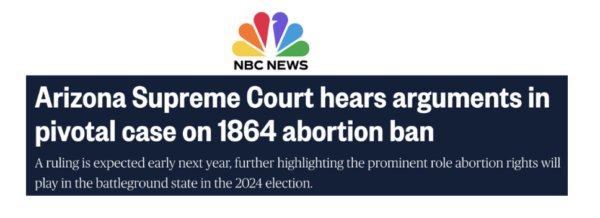
21. Urged the Arizona Supreme Court on behalf of several legal scholars to reject efforts to revert an Arizona law on abortion back in time more than 120 years, which would leave Arizona’s physicians wondering about whether their compliance with some laws will expose them to criminal liability under other laws. As the scholars explain in their brief, overturning the lower court ruling would defy fundamental principles of statutory interpretation—the process by which a court interprets legislation to see how it applies—and ignore a half-century’s worth of abortion policy updates made by the Arizona legislature.

22. Persisted in our lawsuit, filed in 2020 alongside the California Tribal Families Coalition, over the Trump administration’s failure to collect key foster youth data and protect vulnerable Indigenous children as required by law through the Adoption and Foster Care Analysis and Reporting System (AFCARS). AFCARS collects data about the safety, health, and long-term outcomes of almost five hundred thousand children in the U.S. foster system—who overwhelmingly hail from low-income families and families of color, due to systemic inequities.

23. Supported the Department of Justice’s litigation challenging an abortion ban that violates federal law in failing to provide adequate exceptions for emergency care under the Emergency Medical Treatment and Labor Act (EMTALA). For decades, EMTALA has provided the foundation for the emergency care safety net, and has been supported by lawmakers of diverse ideological perspectives. Despite this, a range of state efforts would criminalize doctors who provide abortion even in such emergency circumstances, leaving physicians and their patients in an untenable and unsafe position.